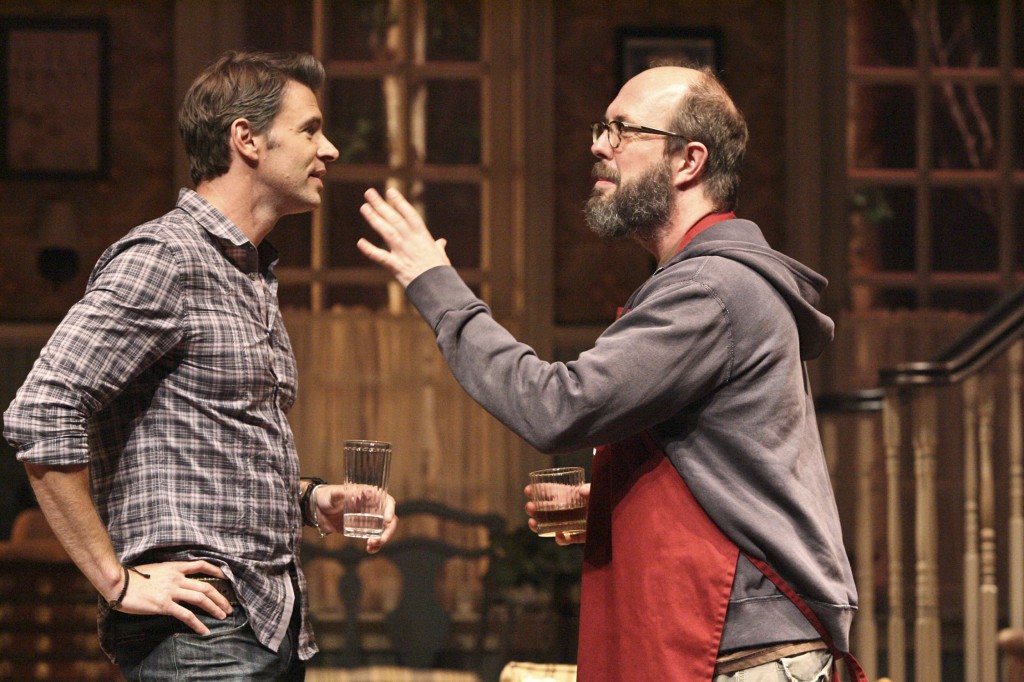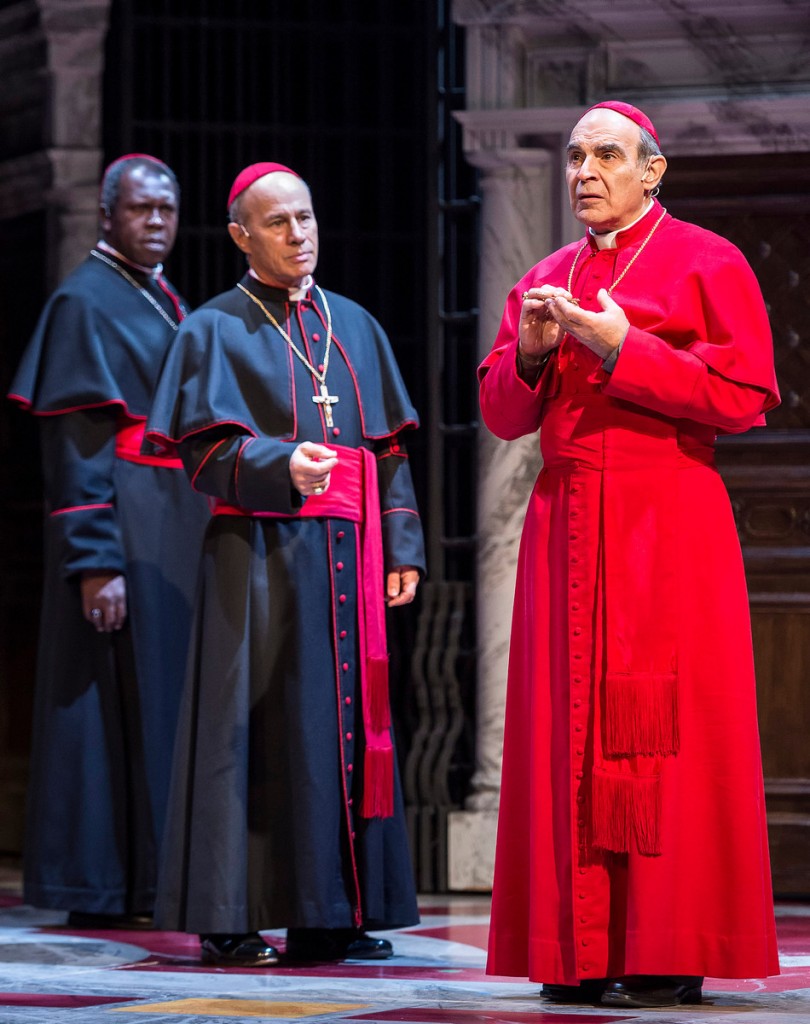The Geffen, in fact, is having a very good month. A second, enticing and very different production is breezing along in its smaller space as well. More on that later. Both are worth your time and your money.
Country House starts out placidly enough as a convivial play about country life in the Berkshires, its pace and characters lightly sketched in languid watercolors. But just as you’re settling in for some cozy family chatter, the play turns a corner. This little conclave is found to be an extended family of actors — successful actors, aspiring actors, failed actors, children of actors, one TV Lothario and a rich-and-famous director of bad films that make teenage boys happy. By now you’ve decided you’re in for an evening of brittle comedy. Wrong again — but not entirely. This is a play that sneaks up on you, its satire and surprises well concealed and explosively timed. Far be it from me to spoil the fun.
Ann (Blythe Danner), the matriarch of the clan, is in her in-between years — in between her still gorgeous looks and the creeping loneliness of incipient age. She oversees her motley crew at a slight remove, as if not sure that she really likes them. The group includes her noisily disappointed grown son Elliot, who lives with her (the exceptional Eric Lange), a college-age granddaughter Susie (Sarah Steele), and a son-in-law, Walter (David Rasche), the filmmaker mentioned above, who, while genuinely mourning the loss to cancer of his beloved wife Kathy — Ann’s daughter and Susie’s Mom — shows up on the one-year anniversary of her death with a gleaming Porsche and a much younger girlfriend, Nell (Emily Swallow), whom he intends to marry.
l-r, Scott Foley and Eric Lange in “Country House.” – Photo by Michael Lamont
Add to this volatility the arrival “for a few nights” of Michael Astor (Scott Foley), an actor friend and everyone’s TV heartthrob, and the fuse is lit for all manner of fireworks, verbal and non, accompanied by the most spectacular of staged thunderstorms (courtesy of lighting and sound designers Peter Kaczorowski and Jon Gottlieb, respectively).
To keep enjoyment at a maximum and Chekhovian parallels to a minimum (those who want to find them will), there shall be no describing the plot. One can, however, describe what the play achieves: the giddy skewering of sententiousness, the phony elevation of “the theat-ah” to sacrosanct art vs. choosing to “sell out” in rank pursuit of big Hollywood money. In the process, we are treated to the play’s very best zingers and guess what? You will find not a single villain in this bunch of deeply flawed, mostly engaging, sometimes annoying characters.
How Chekhovian is that?
The warm interior of Beatty’s 100-year-old New England house invites us to move right in, and Daniel Sullivan directs the complex stage traffic well, even if he cannot entirely smooth over the play’s less than convincing final moments—a weakness that may well be mended by the time this world premiere co-production (with Manhattan Theatre Club) makes its way to a projected Broadway run.
With the exception of a subdued opening night performance from Ms. Danner (she could be more dominant), the acting is uniformly strong and often exceptional. As the conflicted daughter and granddaughter Susie, Steele is notable for delivering an assured, pragmatic, theatre-weary — and wary — performance (“The acting bug? I got it all right; like scarlet fever”). Her singular moment of kindness at play’s end should be a lesson to all.
Unlike Christopher Durang’s Tony-winning Vanya and Sonia and Masha and Spike (now at San Diego’s Old Globe and seen earlier this year at the Mark Taper), The Country House may be Chekhovian in its tongue-in-cheek inspiration, but it is not a spoof. It is a comedy of deep maturity from an ever-evolving playwright with a firm grip on satire.
No stranger to Southern California or to The Geffen, which has previously staged five of his plays, Margulies has continued to develop over the many years. If there were the inevitable lesser works in between, the rise of the good ones such as Sight Unseen and Collected Stories (personal favorites) always proved worth the wait. Margulies was a serious writer from the start who now has become a magisterial talent in our midst.
*
Death of the Author, which plays concurrently in the smaller Audrey Skirball Kenis Theatre at The Geffen, is another animal entirely. This is a delectable ménage à quatre comedy by Steven Drukman that plays out against a backdrop of university life.
It is an entertaining contest of intellectual will and interpretation among Bradley (Austin Butler), the rich kid at the heart of this saga who, intent upon graduating, turns in a highly controversial paper; his ex-girl-friend Sarah (Lyndon Smith), who, despite her protestations, is not entirely through with him; Bradley’s professor Jeff (David Clayton Rogers), a struggling adjunct with an identity problem and an office in a basement supply closet — and the about-to-retire department chair J. Trumbull Sykes, played by a preening Orson Bean, sharp as a tack in a delicious and frequently droll performance. The lives of these four are quizzically, humorously, even touchingly interconnected for the play’s lively 95-minute duration.
l-r, Austin Butler and Orson Bean in “Death of the Author .”- Photo by Michael Lamont
This is a piece for people who love language or perhaps even the mere idea of language. It takes sizable bites out of an exotic intellectual repast, but in a totally agreeable way. References trend to mid-20th-century offbeat French theorists and philosophers (Roland Barthes and Jacques Derrida among them), but you needn’t rush out to buy their books. No need to know much about them to watch this plot unfurl. For all of its onstage pretensions, Death of the Author is familiarly anchored in the politics of behavior — that of ho-hum human beings caught in a tangled academic web. These people are, at all times, just people after all.
The overall context of Death of the Author is fundamentally a tease—a tool for unleashing a nimble and discursive bit of playwriting. Drukman, a prolific playwright and screenwriter, knows the ins and outs of academia (he teaches playwriting at NYU, among other things). The snobbish references add spice to a smorgasbord of more down-to-earth issues: concerns over professional advancement, income inequality, petty and not so petty rivalries, and other forms of brinksmanship. The play is well served also by Bart de Lorenzo, whose brisk direction ensures that our attention never wanders.
Takeshi Kata’s mirrored set, however, is a puzzlement. Do the multiple reflections, when they don’t simply distract, suggest a way of looking at the complexity of individuals? Is it saying there are two or three personas lurking in each one of us? The mirrors do not reflect surroundings, let alone the interior of a basement supply closet. But then we are hovering in halfway territory here—somewhere between reality and metaphor.
If Drukman has a little trouble untangling the web he has so deftly woven, watching him weave it is the charm of this exercise. No one is left untarnished. The clever wordplay is an engaging illustration of our imperfections, sad sacks that we all are. But there is more than mere cleverness at work here. Death of the Author leaves you thinking.
For tickets and information: https://tickets.geffenplayhouse.com/Online/
*
Across town, in contrast, a really pretentious and quite strange English production has invaded the Ahmanson stage through July 6 — its only American appearance on a world tour.
The Last Confession, written by Roger Crane and based on true events, centers on a possible Vatican murder and lots of intrigue in the papal halls of power. It features David Suchet (TV’s Hercule Poirot) as its main draw. The play, which dates to 2007, advertises itself as a murder mystery surrounding the sudden death in 1978 of Pope John Paul I after only 33 days as Pope — a death that was never fully investigated, leading to the usual conspiracy theories. As drama, it is a declamatory throwback to a formal kind of self-important theatre that wore out its welcome long ago. The second act is stronger than the first, but is performed at top speed in top decibel range and goes on for far too long about far too little.
l-r, Roy Lewis, George Spartels and David Suchet in “The Last Confession.” – Photo by Craig Schwartz
In fairness to other views, the audience seemed divided in its reception on the evening I attended. But that does not alter the fact that the production has too many lookalike cardinals and bishops sweeping on and off stage in black or scarlet robes, mouthing pronouncements masquerading as dialogue. It also has an imposing top-heavy set of movable panels in thrall to a pointless choreography all their own, as if to cover up not just for the possibility of a murder, but for the certainty of a stark dramatic void at the heart of this enterprise.
What this play is doing at The Ahmanson is the real mystery.
For tickets and information: https://www.centertheatregroup.org/tickets/
Top image: l-r, Sarah Steele, Eric Lange, Blythe Danner in “The Country House. ” Photo by Michael Lamont



